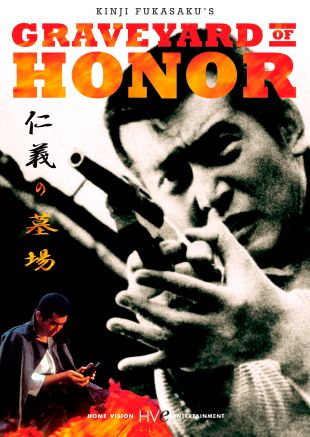With his 1973 masterwork Jinginaki Tatakai (aka Battles Without Honor and Humanity), Kinji Fukasaku injected an intensity and gritty realism into the yakuza genre through his use of the long lens and handheld camera work. For Jingi No Hakaba, a masterpiece in its own right, Fukasaku uses a similar visual style and many of the same generic conventions but the tone is far bleaker. Instead of centering on intrigues of gangland politics, Hakaba focuses on the actions of one inscrutably destructive real-life loser who transgresses not only the laws of polite society but also codes of the underworld. In a country where etiquette is placed at a premium and where almost every community is rigidly hierarchical, Ishikawa's inability to follow the most minimal of social conventions, his flaunting of authority, and his nihilistic individualism set him beyond the pale of almost everyone -- save for his downtrodden girlfriend Chieko. In many respects, this film bares a strong similarity to Shohei Imamura's brilliant Vengeance Is Mine. In both works, the protagonist is a sociopathic outsider who transgresses all conventions. Yet whereas Imamura's Enokizu bares a certain dark charisma and takes a certain glee in his misdeeds, Ishikawa has none of these characteristics. Instead, he seems to be genetically wired to fail, never understanding where his downward spiral began or how to stop its terrible momentum. What gives this film its unexpected emotional weight is Ishikawa's troubled relationship with Chieko. Though he brutalizes her in the beginning of the film, he is so pained by her suicide that he eats her ashes -- a freakish spectacle to a Western eye, perhaps, but a gesture of the utmost grief in Japan. From where the depth of such emotion springs is never explored. Unlike Vengeance -- which delves deep into the psychology of the protagonist -- Ishikawa's twisted inner works remain opaque. Instead, you are left with a character who is an existential conundrum. Just as his later Battle Royale, this film evokes the terror of the abyss to a degree that strains genre convention. Jingi no Hakaba may have the trappings of a gangster epic, but at its heart it is a dark, troubled tale straight out of Dostoyevsky.

Graveyard of Honor (1975)
Directed by Kinji Fukasaku
Genres - Drama, Action, Adventure, Thriller |
Sub-Genres - Crime Drama, Crime Thriller |
Run Time - 93 min. |
Countries - Japan |
MPAA Rating - NR
Share on